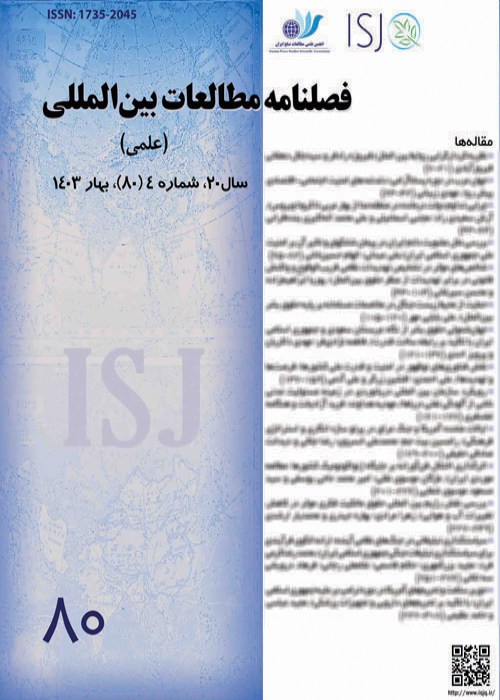TERRORISME ET JUSTICE DE TRANSITION DANS LE DISCOURS ISRAÉLIEN SUR LES TERRITOIRES PALESTINIENS OCCUPÉS: DES CONCEPTS MUTUELLEMENT EXCLUSIFS
Author(s):
Abstract:
This paper discusses persistent and increasing Israeli resistance to any conception of transitional justice as a solution to terrorism in the Occupied Palestinian Territories (oPt). Further، it queries the very notion that the Israeli national narrative and official discourse ultimately perceive Palestinian terrorism as a ‘problem’ greater than serious engagement with Palestinian demands for a process of transitional justice concerning both events since 1967 and those of 1948 would be. It considers whether Israel’s systematic representation of any and all violent manifestations of Palestinian resistance to the occupation of the West Bank and Gaza as terrorism can be deemed sustainable in the long-term given the distinctive status of the oPt in general and the Gaza Strip since 2005 in particular. It has been a key premise of mainstream Israeli discourse since at least the creation of the state in 1948 that no Palestinian violence against Israel or Israelis can be understood as legitimate – much less as a reaction to Israeli state violence towards Palestinians. The very concept of Palestinian retaliation for Israeli actions is excluded since، in Israeli discourse، no equivalence can be drawn between the two forms of violence، and، international law notwithstanding، no Palestinian right to violent resistance can be contemplated. Israel has only، however، been able to use counter-terrorism and ‘security reasons’ as catch-all justifications for all its actions in the oPt by sustaining a discourse arguing for its own persistent – indeed، permanent – existential insecurity – a paradigm which the establishment of a Palestinian state، however devoid of substance in practice، might، in theory at least، put under some stress; and which the disproportionate death tolls of Israel’s recent military interventions in Lebanon (the ‘Second Lebanon War’ of summer 2006) and Gaza (‘Cast Lead’ in December 2008 and January 2009) may have put under some strain. This paper thus explores the key elements of this evolution، largely by examining Israeli policy and discourse surrounding ‘Cast Lead’ as it happened، analyzed as a test case of the new status of the Gaza Strip in the wake of Israeli “disengagement” in 2005، and the paradigms and dynamics of representations of ‘terrorism’ this has engendered. Centrally، it asks whether Israel might prefer to continue its occupation indefinitely than to confront a Palestinian state arising through negotiation – or whether future “disengagements” on the Gaza model would undermine its discourse on Palestinian resistance as terrorism to an extent that Israel itself might ultimately have to deem unviable، forcing it against its will into a scenario in which transitional justice would be the only discursive option left for preventing ‘terrorism’ – and thus for resolving the Palestinian-Israeli conflict.
Language:
English
Published:
International Studies Journal, Volume:6 Issue: 4, 2010
Page:
135
https://magiran.com/p759729
دانلود و مطالعه متن این مقاله با یکی از روشهای زیر امکان پذیر است:
اشتراک شخصی
با عضویت و پرداخت آنلاین حق اشتراک یکساله به مبلغ 1,390,000ريال میتوانید 70 عنوان مطلب دانلود کنید!
اشتراک سازمانی
به کتابخانه دانشگاه یا محل کار خود پیشنهاد کنید تا اشتراک سازمانی این پایگاه را برای دسترسی نامحدود همه کاربران به متن مطالب تهیه نمایند!
توجه!
- حق عضویت دریافتی صرف حمایت از نشریات عضو و نگهداری، تکمیل و توسعه مگیران میشود.
- پرداخت حق اشتراک و دانلود مقالات اجازه بازنشر آن در سایر رسانههای چاپی و دیجیتال را به کاربر نمیدهد.
In order to view content subscription is required
Personal subscription
Subscribe magiran.com for 70 € euros via PayPal and download 70 articles during a year.
Organization subscription
Please contact us to subscribe your university or library for unlimited access!


